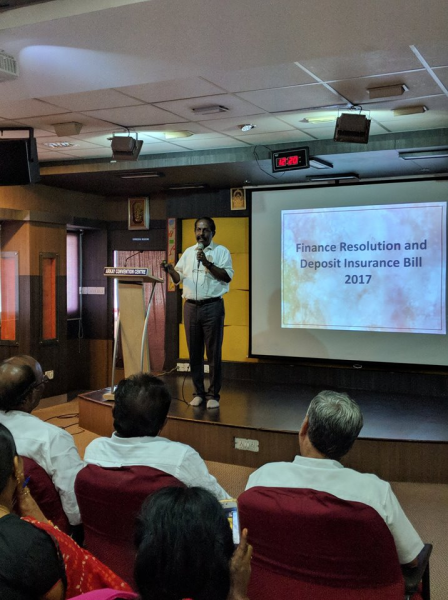The second session of the Consumer Guidance Seminar was on the Financial Resolution and Deposit Insurance (FRDI) Bill. The FRDI Bill aims to monitor financial institutions by establishing the Resolution Corporation (RC) to help streamline banks and financial institutions in the event of financial crisis. Mr. Thomas Franco, General Secretary from All India Bank Officers’ Confederation said that the bill does not take into consideration the Indian economic condition.
In the wake of the global financial crisis in 2008, 432 banks were dissolved in the USA due to heavy debts. The crisis did not affect Indian Banks as the financial system in India is dominated by Public Sector Banks. The US government bailed out banks and created an environment that made some of the banks too big to fail. The Financial Stability Board (FSB) was established by the G7 countries in the aftermath of the global financial crisis of 2008. The FSB now includes all G20 major economies.
Presently, the key attributes of FSB have been copied verbatim into the FRDI Bill. The USA has a "borrower economy" and is drastically different from that of India; the FRDI Billl is therefore not suitable for the country.
What does the Bill say about Resolution Corporation (RC)?:
-
The function of the RC will be similar to RBI - to govern financial institutions in India;
-
RC will provide deposit insurance to banking institutions;
-
It will merge, perform acquisitions, transfer property from one institution to another, etc.;
-
The RC will merge or amalgamate financial institutions in the event of a financial crisis;
-
If a badly performing bank/financial institution is not recovered within two years, then the Resolution Corporation will dissolve such institutions; and
-
RC will act as an administrator and/or resolve for/a specified service provider which has been classified under the category of critical risk to viability.

According to Thomas Franco, Resolution Corporation will prevent the depositors from challenging the decisions made, thus curtailing constitutional remedies. The Resolution Corporation is not an independent body and will be controlled by the Ministry of Finance. He states that the bill is void from the outset, for the following reasons:
-
Right to Constitutional Remedies under Article 32 (4) of the Indian Constitution are curtailed. Section 65 and Section 133 of the FRDI Bill prohibit constitutional remedies by specifically saying that no proceedings for liquidation by a service provider shall be entertained by any court or tribunal, other than the tribunal in accordance with the provisions of this Act.
-
“Bail-in” is the most disastrous clause of the bill. It means the depositors will be asked to bail out the NPA borrowers because of whom the bank may fail. Suddenly the depositors will become creditors to the bank. The RC will decide how much a depositor can withdraw. The rest of the money will be converted into equity/bonds which the depositor may or may not get back. This can lead to a run on the bank.
-
Co-operative Banks may be wound up by RBI/RC. Section 120 and Section 2 (13) of the Bill ensure that once the Bill is passed, all co-operative banks will become “Eligible Co-operative Banks” for winding up. If the banks do not meet the requirements of this Act within 2 years + 1 year (grace period), the co-operative banks will cease to be insured service providers. This will pose a major threat to the State Autonomy, particularly the rural and farming community, as co-operative banks are major drivers of their growth.
-
“Haircut” - Section 44 (2) (b) defines haircut as the percentage reduction in the amount that is payable to the creditors. It is nothing but writing off a part of the principal loan amount, which means the borrower may repay only a part of the loan taken and the lenders will incur losses. Writing off money does not constitute recovery of loan or mitigation of losses. Such provisions will affect the interests of depositors.
-
The bill proposes to bring about various amendments across Acts like SBI Act to create provisions for the liquidation of SBI, RRBs, other Public Sector Banks and Co-operative Banks. This will create insecurity among depositors as 61.5% of the depositors are classified as household depositors with small savings which they keep in banks with the absolute trust that their money is secure.
-
As the question of liquidation does not arise in India, the introduction of the FRDI bill is pointless and will result in the downfall of the banking sector.
He said that a campaign called ”Repeal FRDI Bill” has been initiated - http://www.repealfrdi.net/ to help citizens sign a petition against the bill and can be sent to the Member of Parliament in their area.
He concluded by saying that the banking sector (public sector) has social concerns and has a crucial role in the development of the country. Thus, we should not allow any factor which dilutes its purpose.
Add new comment